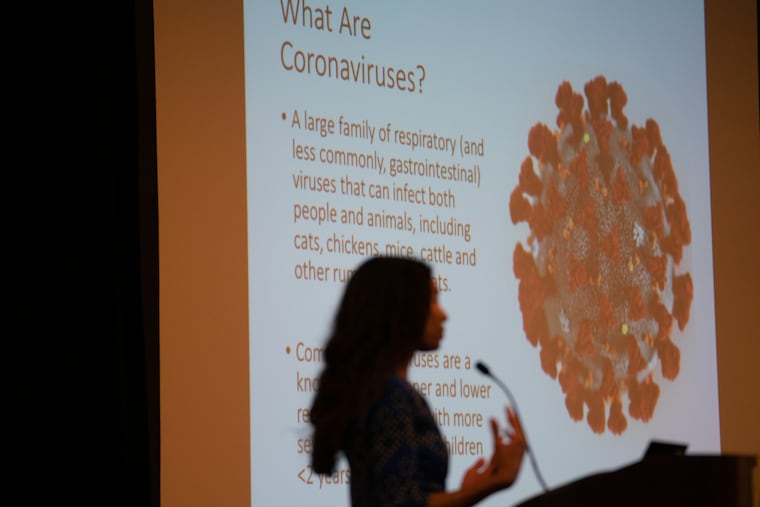Coronavirus leads hospitals to plan for surge in patients while urging sick doctors to stay home
Hospitals may suggest that you postpone that back surgery, or consult your doctor by video chat. In New Jersey, hospitals will limit visitors to protect patients and staff.

Philadelphia health-care executives have been planning since January for coronavirus — amassing supplies, looking at expanding hours, and exploring ways to treat noncritical patients outside the hospital.
Yet one big problem is harder to address: what to do when the doctors, nurses, and support staff get sick.
Keeping staff healthy while easing strain on the health-care system were hot topics Wednesday morning at a forum hosted by the Philadelphia Department of Public Health. Only one patient has tested positive for the coronavirus in the city so far, but infectious-disease specialists expect that’s just the start.
And health workers may feel compelled to work even when sick because they fear there’s no one else to take up the slack, said Jessica Caum, the department’s manager for public health preparedness.
Bad idea, she said, addressing representatives from hospitals, emergency-response agencies, and public health specialists.
"Stay home when you’re sick,” she said. “In health care, we sometimes forget that these rules apply to us, too.”
Last week at the Children’s Hospital of Philadelphia outpatient campus in King of Prussia, a cardiologist treated two dozen patients over four days before he was hospitalized Saturday morning with what turned out to be a coronavirus infection.
CHOP has not said when he began to experience symptoms, but his patients and their families — as well as some of his colleagues — have been urged to quarantine themselves at home and look for signs of illness, the hospital has said.
At a smaller meeting after the health department’s forum, hospital executives reflected on the added issue of losing staff not because they are ill, but because they have been exposed to someone who is.
“Staffing is a big challenge in health care even outside of challenges such as this,” said Jonathan L. Gleason, chief quality officer for Jefferson Health.
P.J. Brennan, chief medical officer at Penn Medicine, stressed that most patients infected with the coronavirus have mild symptoms and will not need to go to a hospital. The key to managing finite hospital resources is to reserve the limited number of critical-care rooms for those who need them.
Hospitals can consider a variety of strategies to ease the strain, Caum said.
One is urging patients to postpone elective surgery and other forms of nonurgent care, where appropriate. Certain procedures can be shifted to outpatient settings. In some cases, “telemedicine” — a video consultation or phone call — makes sense, Caum said.
“A lot of the recommendations here are not one-size-fits-all,” she said.
In addition to the representatives from Penn and Jefferson, the sessions on Wednesday included leaders from Temple Health, the Einstein Healthcare Network, and Independence Blue Cross.
Richard L. Snyder, the chief medical officer for the health insurer, said its members will not be charged a co-payment for telemedicine consultations now that the coronavirus is upon us. That already was true for primary care treatment; the insurer has expanded the no co-pay decision to cover telemedicine calls for specialist care, too, Snyder said. Other private insurers, as well as Medicare and Medicaid, earlier announced coverage for telemedicine visits due to coronavirus.
Meanwhile in New Jersey, a coalition of hospitals announced standardized visitor restrictions Wednesday to protect vulnerable patients and hospital employees from the coronavirus.
All potential visitors will be screened for fever, cough, sneezing, runny nose, and difficulty breathing, and they will be asked about recent travel to countries nations with high coronavirus activity and contact with individuals who have been diagnosed with the new virus or are “under investigation.”
People meeting any of those descriptions will not be allowed to visit, the hospitals said, working with the New Jersey Hospital Association.
In addition, only two visitors will be allowed to visit a patient at the same time, and hospitals will prohibit visitors under age 12.